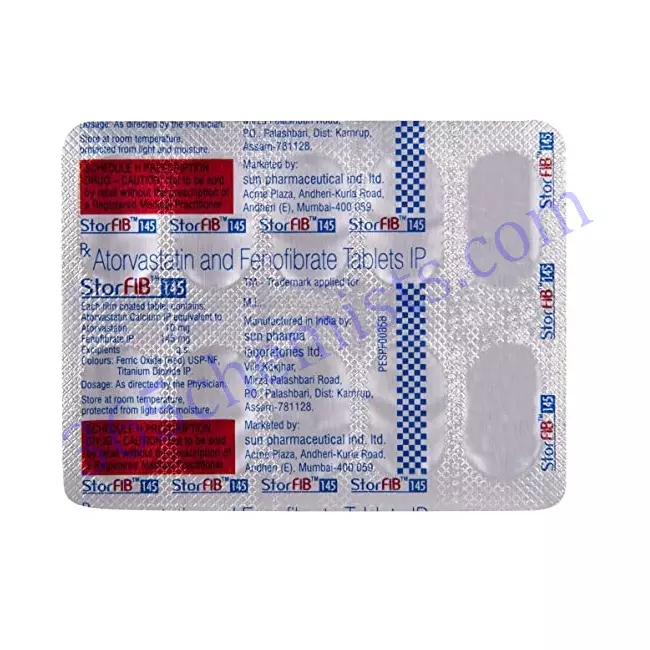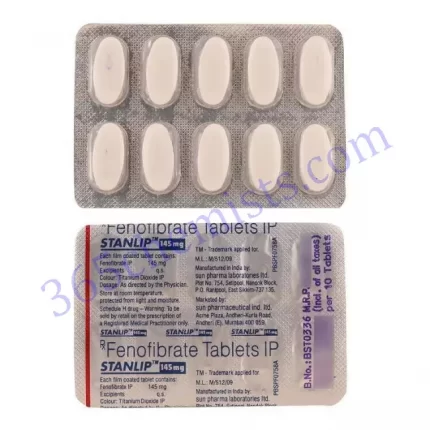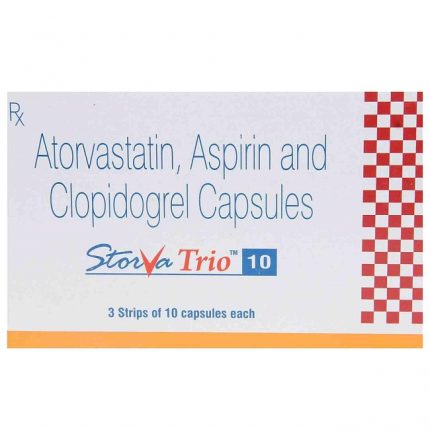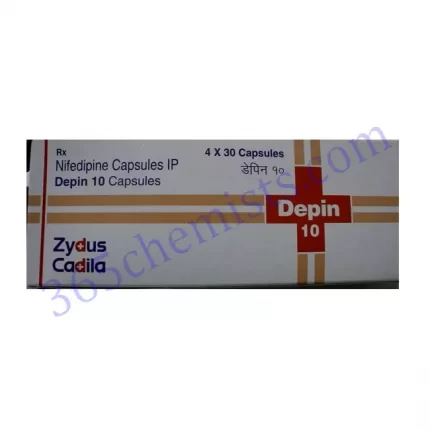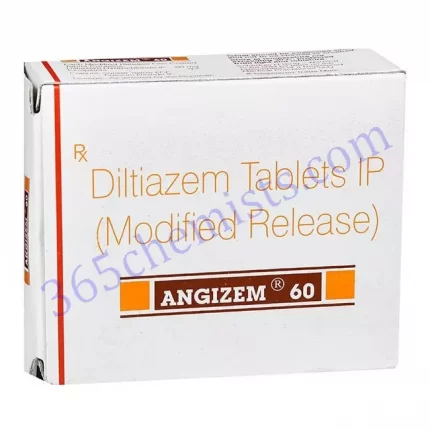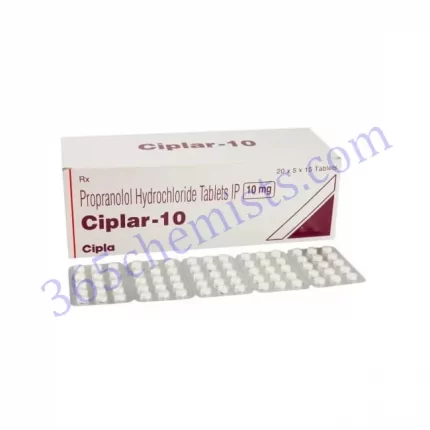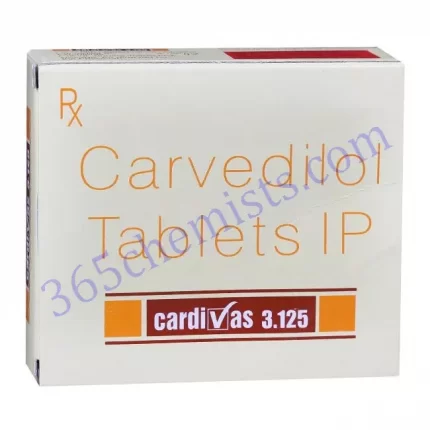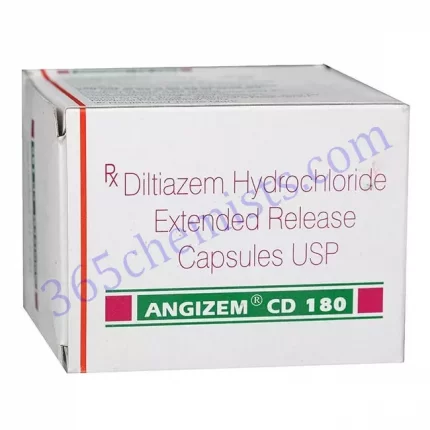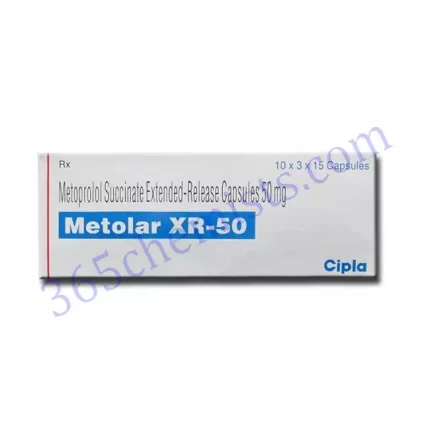Storfib 145mg Tablet (Fenofibrate 145mg):
Fenofibrate is the active component in the Storfib 145mg Tablet. This component is classified as a fibric acid derivative and is a member of the medication class known as anticoagulants. This detailed explanation of Storfib 145mg Tablet is intended to supply vital information regarding the product, such as its applications, dosage, adverse effects, precautions, and other related topics.
Uses of Storfib 145mg Tablet:
The primary application for the Storfib 145mg Tablet is the management of dyslipidemia, which is a condition in which there are abnormal levels of lipids in the blood. Individuals who have low levels of high-density lipoprotein (HDL) cholesterol and high levels of triglycerides are the ones who are recommended to take this medication. Storfib 145mg Tablet helps to improve the lipid profile and reduce the risk of cardiovascular diseases such as heart attack and stroke by lowering triglyceride levels and raising HDL cholesterol levels. Storfib 145mg Tablet also helps to lower total cholesterol levels.
Dosage and Administration:
It is possible for the recommended dosage of Storfib 145mg Tablet to change based on an individual’s lipid profile as well as their response to treatment. It is essential to carry out the directions laid out by the medical professional in charge of your care. One tablet should be taken orally once daily, preferably with food. This is the typical and recommended dose. It is possible to adjust the dosage depending on the levels of lipids as well as the response to treatment. During treatment with Storfib 145mg Tablet, it is typically recommended to perform routine monitoring of the patient’s lipid profile.
Side Effects of Storfib 145mg Tablet:
The Storfib 145mg Tablet is generally well tolerated; however, some people may experience certain adverse effects while taking this medication. Fenofibrate is known to cause gastrointestinal disturbances (such as stomach pain, nausea, and diarrhoea), headaches, dizziness, and abnormal liver function tests as common adverse reactions. These negative reactions to medication are typically mild and short-lived, and they have a tendency to get better as the body gets used to the treatment. Rhabdomyolysis, also known as the breakdown of muscle tissue, pancreatitis, and liver problems are among the more serious adverse reactions that have been linked to the use of the Storfib 145mg Tablet. It is strongly recommended that you seek immediate medical attention in the event that any severe adverse effects manifest themselves.
Precautions and Warnings:
Before beginning treatment with Storfib 145mg Tablet, it is essential to discuss any pre-existing medical conditions, allergies, or medications that you are presently taking with your healthcare provider. It is imperative that any history of liver disease, kidney disease, gallbladder disease, or any other serious health conditions be disclosed. Individuals who have certain conditions, such as renal impairment or gallbladder disease, should use the Storfib 145mg Tablet with extreme caution in order to avoid adverse effects. During treatment with the Storfib 145mg Tablet, it is typically recommended to perform routine monitoring of liver function as well as levels of creatine kinase.
Drug Interactions:
It is possible for the Storfib 145mg Tablet to interact with other medications, which could reduce the effectiveness of those other drugs or raise the risk that they will cause adverse effects. You should let your primary care physician or your chemist know about any and all medications you are currently taking, including over-the-counter medications and herbal supplements. Certain anticoagulants, certain immunosuppressants, and certain statins are examples of common medications that have the potential to have an adverse interaction with Storfib 145mg Tablet. These possible interactions will be evaluated by your healthcare provider, who will then make appropriate adjustments to your medication schedule.
Storage and Handling:
The Storfib 145mg Tablet ought to be kept in a location that is both cool and dry, away from sources of moisture and direct sunlight. It is important to keep the tablets out of the reach of both children and animals. It is essential to check the date of expiration on the medication and to refrain from using it if the date has passed. If you have any concerns or questions regarding the way the Storfib 145mg Tablet should be stored or handled, you should seek the advice of your chemist or another healthcare provider.
Conclusion:
The medication known as Storfib 145mg Tablet (Fenofibrate 145mg) is one that is frequently recommended for the treatment and management of dyslipidemia. Storfib 145mg Tablet helps improve the lipid profile and reduce the risk of cardiovascular diseases by lowering triglyceride levels and raising HDL cholesterol levels. It also helps lower the total cholesterol level. However, it is absolutely necessary to take the medication exactly as directed, to be aware of any potential adverse effects, and to seek personalised guidance from a qualified medical professional. Storfib 145mg Tablet is able to assist individuals in improving their lipid profile while simultaneously lowering the risk of associated complications when these precautions are followed.

